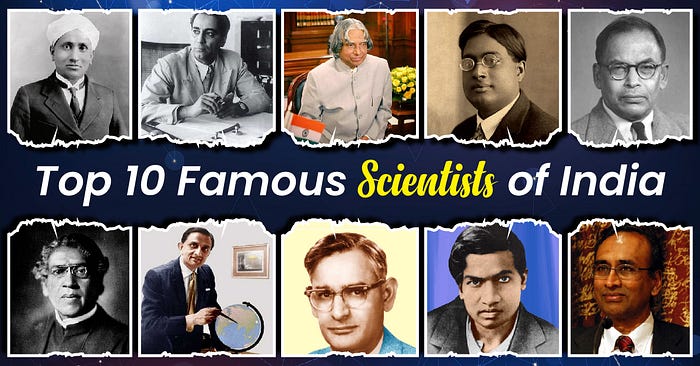Introduction
India has a rich tradition of scientific innovation and discovery, dating back to ancient times. Indian scientists have made significant contributions across various fields such as physics, chemistry, mathematics, and space science. This article highlights the top 10 famous scientists of India, their ground breaking work, and their enduring legacies.

Ancient Indian Scientists
Ancient Indian scholars like Aryabhata, Brahmagupta, and Bhaskara II laid the foundations of modern mathematics and astronomy. Their work on zero, the decimal system, and planetary motions influenced later scientific developments globally.
Contributions to Early Science and Mathematics
In ancient Indian texts such as the Vedas, Puranas, and Upanishads, scientific principles and theories are mentioned. Ayurveda, an ancient medical system, demonstrates early progress in medical science and surgery.
Top 10 Famous Scientists of India
1. C.V. Raman
Chandrasekhara Venkata Raman was born on November 7, 1888, in Tiruchirapalli, Tamil Nadu. He showed a keen interest in science from a young age and excelled in his studies, earning a degree in physics from the University of Madras.
Discovery of the Raman Effect
In 1928, C.V. Raman-Indian Scientist (Bharat Ratan awardee) discovered the Raman Effect, a phenomenon where light changes its wavelength when passing through a transparent medium. This groundbreaking discovery earned him the Nobel Prize in Physics in 1930, making him the first Asian to receive this honor.
Nobel Prize and Legacy
Raman’s work laid the foundation for Raman spectroscopy, a powerful tool used in chemical analysis and material science. His legacy continues to inspire generations of scientists in India and worldwide.
2. Homi J. Bhabha
Homi Jehangir Bhabha was born on October 30, 1909, in Mumbai. He pursued higher education at the University of Cambridge, where he made significant contributions to nuclear physics.
Contributions to Nuclear Physics
Bhabha’s research in cosmic rays and quantum mechanics established him as a prominent physicist. He is best known for his work on the cascade theory of electron showers.
Establishment of BARC and TIFR
As the founding director of the Tata Institute of Fundamental Research (TIFR) and the Bhabha Atomic Research Centre (BARC), Bhabha played a crucial role in developing India’s nuclear program. His vision and leadership were instrumental in making India a nuclear-capable nation.
3. A.P.J. Abdul Kalam
Avul Pakir Jainulabdeen Abdul Kalam was born on October 15, 1931, in Rameswaram, Tamil Nadu. He studied aerospace engineering at the Madras Institute of Technology.
Role in India’s Missile and Space Programs
Kalam’s contributions to India’s missile development earned him the title “Missile Man of India.” He played a pivotal role in the development of the Agni and Prithvi missiles, and he also contributed significantly to India’s civilian space program.
Presidency and Contributions to Education
As the 11th President of India, Kalam was known for his vision of transforming India into a developed nation by 2020. His focus on education, particularly in science and technology, has left a lasting impact on the country.
4. Satyendra Nath Bose
Satyendra Nath Bose was born on January 1, 1894, in Kolkata. He excelled in mathematics and physics from a young age and earned a degree from the University of Calcutta.
Work with Einstein and Bose-Einstein Statistics
Bose’s collaboration with Albert Einstein led to the development of Bose-Einstein statistics, a fundamental concept in quantum mechanics. This work laid the groundwork for the discovery of the Bose-Einstein condensate, a new state of matter.
Legacy in Quantum Mechanics
Bose’s contributions to theoretical physics have had a profound impact on the field. His work is honored by naming bosons, particles that obey Bose-Einstein statistics.
5. Meghnad Saha
Meghnad Saha was born on October 6, 1893, in Shaoratoli, Dhaka. He studied at the Presidency College in Kolkata and later at the University of Calcutta.
Saha Ionization Equation
Saha is best known for his development of the Saha Ionization Equation, which describes the physical and chemical conditions in stars. This equation is fundamental to the field of astrophysics.
Contributions to Astrophysics
Saha’s work on stellar spectra and ionization has significantly advanced our understanding of the stars and the universe. He also played a crucial role in establishing several scientific institutions in India.
6. Jagadish Chandra Bose
Jagadish Chandra Bose was born on November 30, 1858, in Mymensingh, Bengal. He studied at St. Xavier’s College, Kolkata, and later at the University of London.
Contributions to Radio Science and Plant Biology
Bose’s pioneering research in radio and microwave optics laid the groundwork for the development of wireless communication. He is also known for his experiments on plant physiology, demonstrating that plants have feelings.
Legacy and Recognitions
Bose’s contributions to science are celebrated worldwide, and his work continues to influence various fields, including botany and communication technology.
7. Vikram Sarabhai
Vikram Ambalal Sarabhai was born on August 12, 1919, in Ahmedabad, Gujarat. He studied at the University of Cambridge and later at the Indian Institute of Science.
Establishment of ISRO
Sarabhai is best known as the father of the Indian space program. He established the Indian Space Research Organisation (ISRO) in 1969, which has since become a global leader in space exploration.
Contributions to the Indian Space Program
Sarabhai’s vision and leadership were instrumental in launching India’s first satellite, Aryabhata, in 1975. His contributions have laid the foundation for India’s successful space missions, including Chandrayaan and Mangalyaan.
8. Har Gobind Khorana
Har Gobind Khorana: Famouse Indian Scientist was born on January 9, 1922, in Raipur, Punjab. He studied at the University of Punjab and later at the University of Liverpool.
Genetic Code and Protein Synthesis
Khorana’s research on the genetic code and protein synthesis earned him the Nobel Prize in Physiology or Medicine in 1968. His work has had a significant impact on the field of molecular biology.
Nobel Prize and Research Contributions
Khorana’s contributions to understanding the genetic code have paved the way for advancements in genetic engineering and biotechnology. His legacy continues to inspire researchers worldwide.
9. Srinivasa Ramanujan
Srinivasa Ramanujan was born on December 22, 1887, in Erode, Tamil Nadu. Despite limited formal education, his genius in mathematics was evident from a young age.
Contributions to Mathematics
Indian mathematician Ramanujan made substantial contributions to mathematical analysis, number theory, and continued fractions. His work on infinite series and modular forms has had a lasting impact on mathematics.
Legacy and Influence in Modern Mathematics
Ramanujan’s legacy is celebrated worldwide, and his life and work continue to inspire mathematicians. His notebooks, filled with groundbreaking discoveries, remain a source of inspiration and study.
10. Venkatraman Ramakrishnan
Venkatraman Ramakrishnan was born on April 5, 1952, in Chidambaram, Tamil Nadu. He studied at the University of Baroda and later at Ohio University.
Research on Ribosome Structure
Ramakrishnan’s research on the structure and function of the ribosome, the cellular machinery for protein synthesis, earned him the Nobel Prize in Chemistry in 2009.
Nobel Prize and Impact on Molecular Biology
Ramakrishnan’s work has significantly advanced our understanding of the ribosome’s role in cellular processes. His research continues to influence the fields of molecular biology and biochemistry.
Conclusion
The top ten Indian scientists have made significant contributions to different fields of science. Their legacies continue to inspire and shape the future of scientific research in India and beyond, deeply rooted in the rich tapestry of Indian history and culture. Drawing inspiration from the ancient wisdom of Ved Purans, These scientists have not only advanced modern science but also honored the timeless knowledge passed down through generations. Their work resonates with the spirit of Bharat Mata. Their contributions have profoundly influenced scientific education and research in India, inspiring countless students to pursue careers in science and technology while celebrating India’s cultural heritage.

Comments
Post a Comment